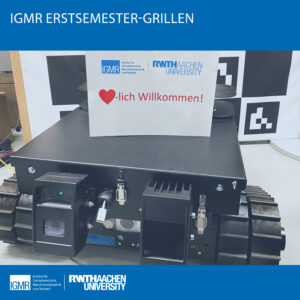Schlagwort: ‘IGMR’
Welcoming the new Master’s first semester students
The Institute of Transmission Technology, Machine Dynamics and Robotics welcomes all new first-semester Master’s students!
The summer semester started on 03.04.2023 and with it the Master’s program for many first-semester students. At a welcome barbecue organized by the Mechanical Engineering student council, we were able to introduce our institute and talk to students.
Sophie Charlotte Keunecke, Nils Brückmann, Vincent Brünjes and Thomas Knobloch welcomed the new Master’s students from the Faculty of Mechanical Engineering at the IGMR. This allowed the students to make their first contacts with the institutes and also get to know various projects. A special highlight was the presentation of the Robot Companion by Maximilian Hilger!
We would like to thank the Mechanical Engineering student council for this great offer and your immense commitment.
We wish all new first-year students all the best for their studies and an unforgettable time at RWTH and the Faculty of Mechanical Engineering.
Contacts:
Sophie-Charlotte Keunecke
Nils Brückmann
Vincent Brünjes
Thomas Knobloch
Successful workshops with the Technical University of Liberec
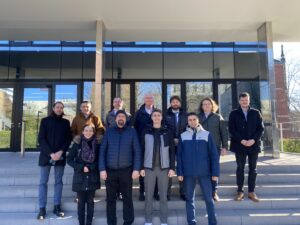
Four different institutes of the Technical University of Liberec introduced us to their fascinating projects and interesting presentations before we worked out common research interests in smaller workshops.
The Technical University of Liberec and the IGMR can already look back on many years of joint exchange and close cooperation; the restrictions imposed by the pandemic have not weakened this, but have severely limited it.
Therefore we are pleased to be able to strengthen our cooperation with new, joint research interests in the future.
Contact: Sophie Charlotte Keunecke
Development of new wrists for the Paragrip
In a joint research project of the IGMR together with the ISF of the RWTH Aachen University, the Multidirectional Additive Manufacturing (MDAM) of metallic components is being researched. In order to optimize the multi-armed. Paragrip robot for this application, student Raphael Hoffmann has developed an innovative concept of a new robotic wrist in his bachelor thesis. The concept enables the welding current to be conducted directly through the wristsm without the need for an additional ground cable attached to the print bed. Moreover, the wrists enable form fitting gripping of the print bed with self-centering to minimize positioning inaccuracies.
You can find the video on our YouTube channel: https://youtu.be/VdT1rjYG4D0
Contact:
Jan Wiartalla
MobiLamas
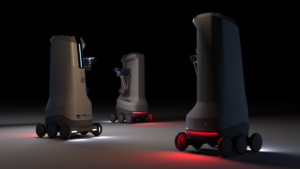
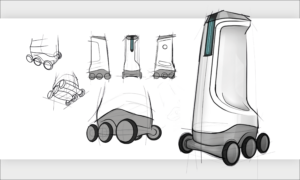
MobiLamas is a concept for free-float charging in the city of the future. In our vision, individual transport will shift from cars to public transport, complemented by so-called last-mile vehicles (e.g., electric bikes or scooters). In such environments, ecological and economical solutions are needed to enable safe and smart charging for a variety of devices. MobiLamas are intelligent mobile robots that interact with last-mile vehicles and charging stations, and safely navigate urban spaces in the presence of pedestrians.
Contact:
IGOR – our in-house robot
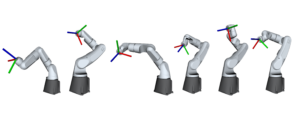
Markus Schmitz
How construction site robots work on a wall
The in-house developed robot has 7 degrees of freedom, which are realized exclusively via revolute joints. Due to the redundancy, the robot can also develop its full performance in narrow situations such as corridors or niches. The video on the left shows a vertical trajectory in which the robot works on a wall from the floor to a height of 2.50m. The video on the right shows the horizontal trajectory of a wall immediately in front of the robot.
More information about this project can be found on the IGMR Website.
Contact person:
M.Sc. Robotic Systems Engineering
Der an dieser Stelle eingebundene Inhalt führt Sie auf Seiten, die von der von Google betriebenen Seite YouTube - YouTube, LLC, 901 Cherry Ave., San Bruno, CA 94066, USA - zur Verfügung gestellt werden. Mit dem Aufruf des Inhalts kann YouTube Ihre IP-Adresse und die Sprache des Systems, sowie verschiedene browserspezifische Angaben ermitteln. Wenn Sie in Ihrem YouTube-Account eingeloggt sind, ermöglichen Sie YouTube, Ihr Surfverhalten direkt Ihrem persönlichen Profil zuzuordnen. Dies können Sie verhindern, indem Sie sich aus Ihrem YouTube-Account ausloggen. YouTube verwendet Cookies und Tracking-Tools. Die Datenverarbeitungsvorgänge sowie die Zwecke der Verarbeitung können direkt bei YouTube erfragt und eingesehen werden.
Weitere Informationen zum Masterstudiengang können der Institutsseite entnommen werden.
Ansprechpartner:
AI task scheduling explained
Artificial Intelligence task scheduling explained using an industry scenario.
https://youtu.be/qNDgJc1XUPM
The Automated Task Planning is intended to support the use of robots in flexible environments.
Traditional robot programming as a sub-area of work preparation processes poses great challenges to individual productions with small quantities. Automated Task Planning promises to address the problems.
In the video, in addition to the introduction and classification of Automated Task Planning, the steps required for its implementation and the benefits that result from its use are presented.
The concept was validated during research at IGMR using a simulation, which is used in the examples in the video.
Contact person:
New chain-driven mobile robot at IGMR
Der an dieser Stelle eingebundene Inhalt führt Sie auf Seiten, die von der von Google betriebenen Seite YouTube - YouTube, LLC, 901 Cherry Ave., San Bruno, CA 94066, USA - zur Verfügung gestellt werden. Mit dem Aufruf des Inhalts kann YouTube Ihre IP-Adresse und die Sprache des Systems, sowie verschiedene browserspezifische Angaben ermitteln. Wenn Sie in Ihrem YouTube-Account eingeloggt sind, ermöglichen Sie YouTube, Ihr Surfverhalten direkt Ihrem persönlichen Profil zuzuordnen. Dies können Sie verhindern, indem Sie sich aus Ihrem YouTube-Account ausloggen. YouTube verwendet Cookies und Tracking-Tools. Die Datenverarbeitungsvorgänge sowie die Zwecke der Verarbeitung können direkt bei YouTube erfragt und eingesehen werden.
The Jaguar V2 is rainproof and can climb over obstacles and stairs thanks to its chain drive and flipper mechanisms. A first test can be seen in the video.
Contact:
Autonomous screw detection in SHAREWORK
Der an dieser Stelle eingebundene Inhalt führt Sie auf Seiten, die von der von Google betriebenen Seite YouTube - YouTube, LLC, 901 Cherry Ave., San Bruno, CA 94066, USA - zur Verfügung gestellt werden. Mit dem Aufruf des Inhalts kann YouTube Ihre IP-Adresse und die Sprache des Systems, sowie verschiedene browserspezifische Angaben ermitteln. Wenn Sie in Ihrem YouTube-Account eingeloggt sind, ermöglichen Sie YouTube, Ihr Surfverhalten direkt Ihrem persönlichen Profil zuzuordnen. Dies können Sie verhindern, indem Sie sich aus Ihrem YouTube-Account ausloggen. YouTube verwendet Cookies und Tracking-Tools. Die Datenverarbeitungsvorgänge sowie die Zwecke der Verarbeitung können direkt bei YouTube erfragt und eingesehen werden.
In the SHAREWORK project, we have developed a method for detecting screws during the assembly of rotary tables. The method is easy to adapt and consists of two parts. First, test data is generated and the classifier is trained. The system can then be used in real applications. You can see exactly what this looks like in the video.
Contact:


